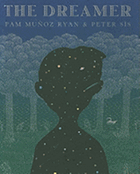
 The childhood of a Chilean poet may seem like an unlikely subject for a children's book, but not in Ryan's (Esperanza Rising, When Marian Sang) capable hands. This spare, lyrical story of young Neftalí Reyes will be salve on the emotional wounds of any child who feels misunderstood by his parents, thinks differently than everyone in his town or feels alone in his compassion for the persecuted. Adults will recognize who the poet Neftalí grew up to be, but for young readers, Ryan explains the necessity of the poet's adoption of the name Pablo Neruda (1904–1973)--even as a teenager, he was in grave danger for expressing in his poetry his disagreements with the government and his support of the Mapuche Indians (the indigenous people of Araucania), who were being run off of their land.
The childhood of a Chilean poet may seem like an unlikely subject for a children's book, but not in Ryan's (Esperanza Rising, When Marian Sang) capable hands. This spare, lyrical story of young Neftalí Reyes will be salve on the emotional wounds of any child who feels misunderstood by his parents, thinks differently than everyone in his town or feels alone in his compassion for the persecuted. Adults will recognize who the poet Neftalí grew up to be, but for young readers, Ryan explains the necessity of the poet's adoption of the name Pablo Neruda (1904–1973)--even as a teenager, he was in grave danger for expressing in his poetry his disagreements with the government and his support of the Mapuche Indians (the indigenous people of Araucania), who were being run off of their land.
From a young age, Neftalí hears the music in the rain ("plip-plip/ plop / bloop, bloop, bloop..."), smells the peppery scent of tiny blossoms in the spring air, and sees in the scales of a pine cone "a carousel of iridescent wings." His father calls him "absentminded," but to Neftalí that makes no sense: "How could he be absentminded when his head was so crowded with thoughts?" The patriarch, "a railroader," uses his whistle to alert his family when he's home and to call them to dinner. He shuns his older son Rodolfo's beautiful singing voice and wants Neftalí to be a doctor or dentist ("Do you want to be a skinny weakling forever and amount to nothing?" Father asks Neftalí). Luckily, Mamadre, Neftalí's stepmother (the boy's mother died two months after his birth), is gentle and kind when their father is on his trips, and he is also close to Rodolfo and Laurita, his younger sister. Ryan's judicious use of events from the hero's childhood charts his development into the thoughtful, upstanding person he would become: a toy sheep given to Neftalí anonymously through a hole in the boy's fence (Neftalí tries to find the giver but never does); a fleeting friendship with a Mapuche on a riverboat; his devotion to a swan near the summer house where he and his family stay; the act of arson that destroys the office of his beloved Uncle Orlando's newspaper, La Mañana.
Ryan also pens original poetry that evokes the work of Neruda (a small sampling appears at the back of the book). Neftalí, about to go with their father on a much-anticipated train trip to the forest, receives from Rodolfo some cautionary advice. In a nod to Neruda's The Book of Questions, Ryan follows the warning with a poem: "Which is sharper? The hatchet that cuts down dreams? Or the scythe that clears a path for another?" Only much later in the book does the meaning of the poem take on its full impact. Sís, master of the symbolic, makes an ideal match for Ryan's narrative, opening each chapter with a triptych of images, and transforming real objects that take on mythic significance to the young poet. Together Ryan and Sís convey the power of poetry--and art--to lift the human spirit, no matter how much others may attempt to confine it.--Jennifer M. Brown

